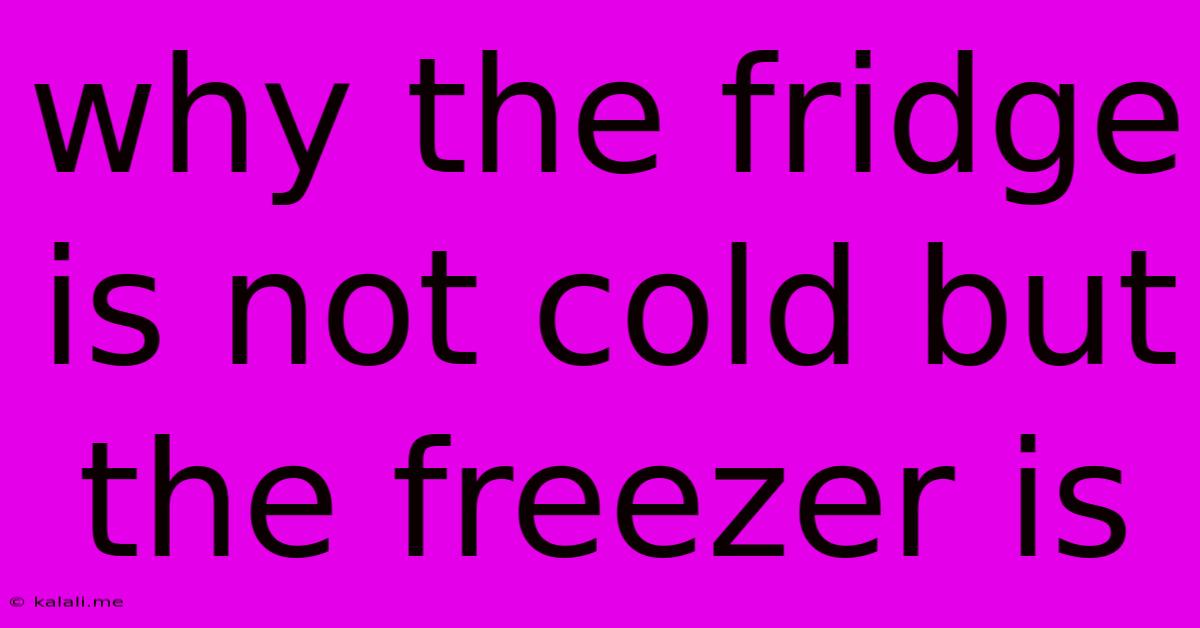Why The Fridge Is Not Cold But The Freezer Is
Kalali
May 31, 2025 · 3 min read

Table of Contents
Why is My Fridge Not Cold But My Freezer is Freezing? Troubleshooting Common Refrigerator Problems
Is your freezer diligently churning out ice while your refrigerator stubbornly refuses to chill? This common problem can be frustrating, leaving you with a freezer full of ice cream and a fridge full of questionable leftovers. This article will delve into the potential causes of this frustrating issue, helping you diagnose and (hopefully) resolve the problem without calling a repair technician.
Possible Causes and Solutions
The most likely culprit behind a freezing freezer and a warm refrigerator is a malfunctioning refrigerator system. This system includes several key components working in harmony: the compressor, condenser coils, evaporator coils, and refrigerant. Let's explore the potential problems within each:
1. Issues with the Refrigerant
The refrigerant is the crucial component responsible for absorbing heat from inside the fridge and releasing it outside. Low refrigerant levels are a common cause of uneven cooling. A leak in the refrigerant line is the usual suspect here. Leaks are usually caused by damage or corrosion to the refrigerant lines. This requires professional repair as it involves handling refrigerants, which require specialized equipment and knowledge.
2. Faulty Compressor
The compressor is the heart of the refrigeration system, pumping the refrigerant through the system. A failing compressor won't effectively circulate the refrigerant, leading to a cold freezer (as it's closer to the compressor) and a warm refrigerator. Symptoms of a bad compressor include unusual noises (humming, clicking, or rattling) and a noticeably warm compressor. Replacing a compressor is a complex repair usually best left to a professional.
3. Clogged Condenser Coils
The condenser coils release the absorbed heat into the room. Dust and debris buildup on these coils significantly reduces their efficiency. A clogged condenser coil system hinders heat dissipation, impacting the overall cooling capacity. Cleaning these coils is relatively straightforward, involving vacuuming or gently brushing away the accumulated dust and dirt. Refer to your refrigerator's manual for proper coil location and cleaning instructions.
4. Problems with the Evaporator Fan Motor
The evaporator fan motor circulates cold air within the refrigerator compartment. A malfunctioning fan motor will prevent proper air circulation, resulting in inconsistent temperatures. You might notice a lack of airflow or unusual noises emanating from the fan itself. Replacing the evaporator fan motor is often a DIY-friendly repair, but you should still consult your refrigerator's manual.
5. Door Seal Issues
A poorly sealed refrigerator door allows warm air to enter, reducing cooling efficiency. Check the door seals for any cracks, tears, or looseness. A simple test involves placing a piece of paper against the door seal and closing the door. If you can easily pull the paper out, the seal needs to be repaired or replaced.
6. Temperature Control Issues
Incorrect temperature settings can lead to ineffective cooling. Ensure the refrigerator temperature is set appropriately – typically between 35-38°F (1.7-3.3°C). If the thermostat itself is malfunctioning, it may require replacement.
7. Freezer Door Issues
Similarly to refrigerator door issues, a poorly sealing freezer door can impact overall cooling efficiency. Check the freezer door seal for any damage or looseness.
When to Call a Professional
While some minor repairs, such as cleaning the condenser coils, can be tackled at home, issues involving refrigerant leaks, compressor failure, or complex electrical components should always be handled by a qualified appliance repair technician. Attempting to repair these issues yourself could be dangerous and might void any warranty.
By systematically checking these components, you'll greatly increase your chances of identifying the problem and restoring your refrigerator to its proper chilling function. Remember to always prioritize safety and consult your refrigerator's manual or a qualified technician when necessary.
Latest Posts
Latest Posts
-
Are Forks On A Bicycle Supposed To Be Lubricated
Jun 01, 2025
-
Which Would You Like To Read First Drag And Drop
Jun 01, 2025
-
Usr Bin Vs Usr Local Bin
Jun 01, 2025
-
Why Is The Force Subscript Not Written In The Us
Jun 01, 2025
-
How To Unlock A Macos App That Has A Padlock
Jun 01, 2025
Related Post
Thank you for visiting our website which covers about Why The Fridge Is Not Cold But The Freezer Is . We hope the information provided has been useful to you. Feel free to contact us if you have any questions or need further assistance. See you next time and don't miss to bookmark.